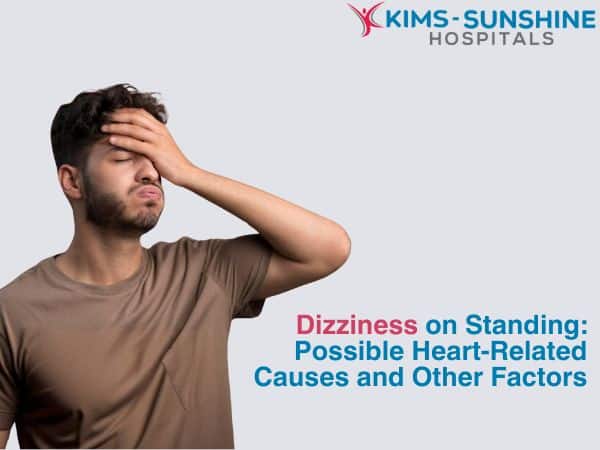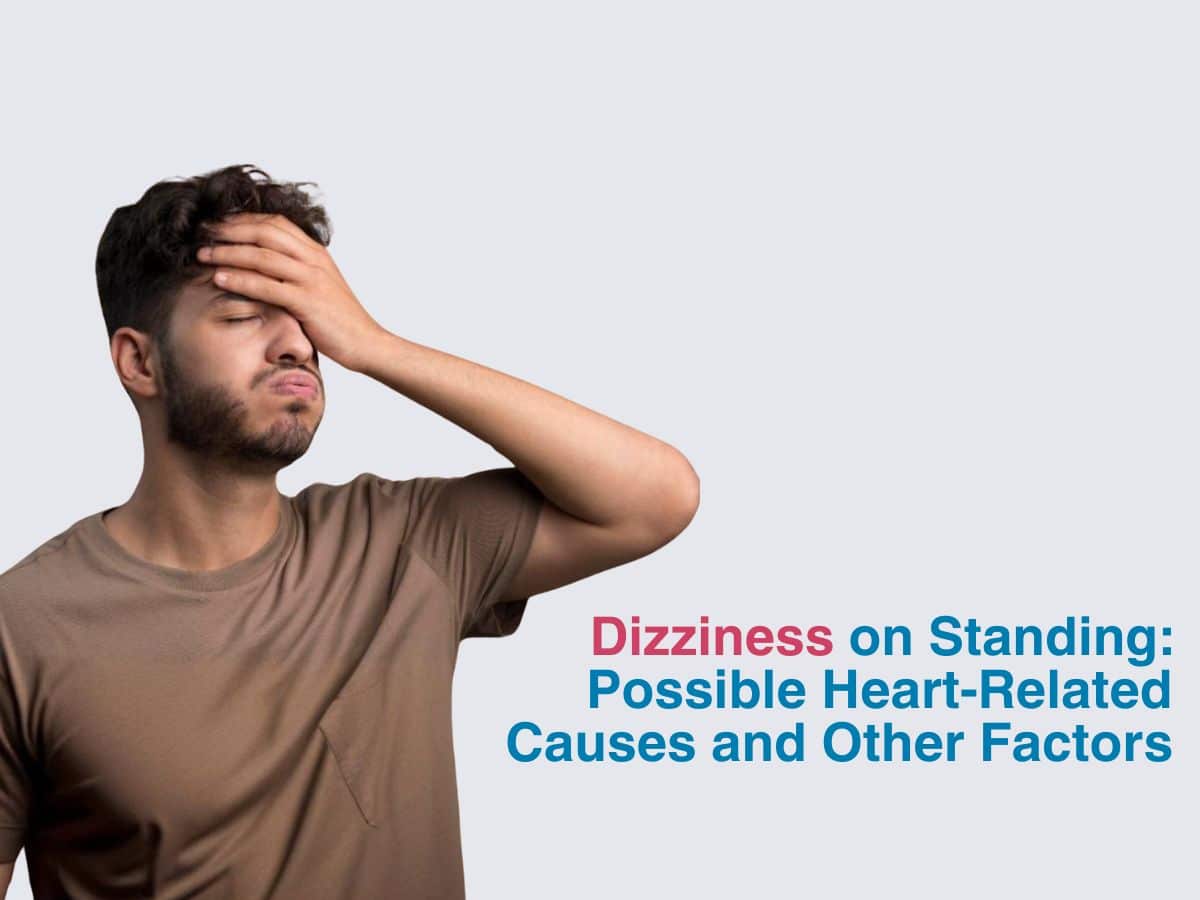
Dizziness on Standing: Possible Heart-Related Causes and Other Factors

Have you ever gotten up from the sofa to grab something, only to feel like you’ve suddenly boarded a ride at Wonderla?
You’re not alone!
That dizzy sensation when standing up is more common than you might think and while it can sometimes be as simple as “oops, got up too fast,” it could also be your body’s way of sending you important signals about your heart health.
What’s Really Going On?
Remember that time you stood up too quickly during a Netflix marathon and felt like you were starring in your own personal dizzy movie? That’s what doctors call orthostatic hypotension – a medical term for “My blood pressure just dropped really fast.” When you stand up, gravity pulls blood toward your feet (thanks to physics!) and sometimes your body’s “bounce back” system isn’t quite as quick as your desire to get up.
Heart Matters – Your Ticker Needs a Talking To
Your heartis an important organthat isn’t just that keeps blood flowing where it needs to go.
Here’s when dizziness might be related to the heart:
1. Arrhythmias
- Irregular heartbeats can make blood flow irregularly.
- Symptoms might feel like your heart’s rhythm is not synchronised.
2. Low Blood Pressure
- Sometimes your blood pressure drops quickly.
- Can make standing up feel like a major challenge.
3. Dehydration
- Affects blood volume and makes your heart work harder
When Should You Stop Playing Doctor Google?
While most cases of standing dizziness is not serious, some red flags should send you running to the doctor:
- Fainting episodes
- Severe chest pain
- Severe headaches
- Heart palpitations
How to Avoid Dizziness
Want to avoid doing the dizzy dance every time you stand up?
Here’s your game plan:
1. The Slow and Steady Approach
- Rise like a sloth, not like a jack-in-the-box
- Give your body time to adjust
2. Stay Hydrated
- Drink water like it’s your job
- Aim for atleast 3liters per day
3. Salt
- A healthy amount of salt helps maintain blood pressure
- But remember moderation is key
4. Exercise
- Regular exercise trains your heart like a professional athlete
- Start small – no one expects you to run a marathon tomorrow
The Medication Station
Some medications can make you dizzier:
- Blood pressure medications
- Heart rhythm drugs
- Anxiety medications
- Diuretics
The Anxiety Factor
Sometimes anxiety is the reasonyou may have dizziness, in which case you can consider:
- Breathing exercises
- Mindfulness practices
- Talk therapy
- Stress management techniques
Conclusion
While getting dizzy when standing isn’t always a heart-stopping emergency, it’s important to listen to your body. If your world is spinning more often than a washing machine, it might be time to have a heart-to-heart with your doctor.
Remember: Your body is smarter than your smartphone – when it sends you signals, pay attention.
This blog post is for informational purposes only and should not replace professional medical advice. If you’re concerned about dizziness or heart-related symptoms, please consult with a healthcare provider.
Frequently Asked Questions
1. What is orthostatic hypotension and how does it cause dizziness?
Orthostatic hypotension is like a loading screen glitch. When you stand up, your body needs to quickly adjust blood flow to compensate for gravity’s effects. With orthostatic hypotension this doesn’t happen.
Common symptoms:
- Blood pools in your lower body
- Blood pressure drops temporarily
- Your brain gets less oxygen for a few moments
This usually resolves within seconds to minutes, but if it happens frequently, it’s worth discussing with your doctor.
2. How do heart arrhythmias contribute to dizziness?
When your heart’s rhythm is off:
- Blood flow becomes irregular
- Your brain receives inconsistent oxygen supply
- Standing up adds extra stress on the body
This can manifest as:
- Feeling lightheaded
- Brief dizzy spells
- A sensation of the room tilting
- Sometimes, a feeling like your heart is “skipping beats”
3. Can dehydration cause dizziness when standing and how is it related to heart health?
Absolutely! When you’re dehydrated:
- Blood volume decreases
- Your heart has to work harder
- Standing up requires even more effort from this already strained system
The heart connection:
- Reduced blood volume makes your heart pump faster
- Blood pressure may drop
- Your heart might feel like it’s running a marathon while just moving from sofa to kitchen
4. When should dizziness on standing be a cause for concern?
While most cases of standing dizziness are benign, certain red flags should send you to the doctor faster than a cat chasing a laser pointer:
Immediate Medical Attention Needed:
- Fainting episodes
- Chest pain or pressure
- Severe headache with dizziness
- Difficulty speaking or confusion
- Numbness or weakness on one side
Schedule a Check-up If:
- Dizziness occurs daily
- Episodes are getting more frequent or severe
- You’ve started a new medication
- Dizziness interferes with daily activities
- You’re over 50 and experiencing new onset dizziness
5. What lifestyle changes can help prevent dizziness related to heart conditions and low blood pressure?
Movement Modifications:
- Rise like a sloth, not a rabbit
- Walk slowly for the first few steps
- Flex your calf muscles before standing
Hydration Habits:
- Drink water consistently throughout the day
- Aim for pale yellow urine
- Consider electrolyte beverages if you’re active
Dietary Adjustments:
- Moderate salt intake
- Eat smaller, more frequent meals
- Limit alcohol
Exercise Smart:
- Regular cardiovascular exercise
- Include reclined exercises if standing is challenging
- Try resistance training to improve blood vessel tone
Sleep & Stress:
- Maintain regular sleep patterns
- Practice stress reduction techniques
- Consider compression socks

Dr. Nava Vikas Jukanti
MBBS, MD (General Medicine)
Sr. Consultant General Physician






